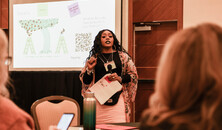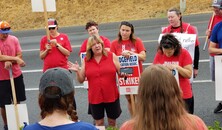Uncovering student potential at Walla Walla Community College

A social worker who came to class without enough bus fare to get home. A high school math teacher and union leader who came to the country undocumented. A college student and budding entrepreneur with dreams to change society.
A former convict who now helps transition the worst offenders. Their connection? Susan Palmer, a Walla Walla Community College sociology professor, who changes lives every day.
The tattoos on Joe Field’s hands remind him of the four agreements he strives to live by and the words his college professor Susan Palmer shared with him in his darkest moments: Be impeccable with your word; don’t take anything personally; don’t make assumptions and always do your best. They are the principles from author Don Miguel Ruiz. They are permanent reminders of a code of conduct, much like the lessons Palmer brings to her classes and interactions with her students and colleagues.
Ten years ago, Field, sober and newly released from prison, started school at Walla Walla Community College (WWCC). His first class: sociology with Susan Palmer. He recalls looking at the course syllabus that included a research paper requirement, and nearly walking right out. He says he didn’t even know what the word, sociology, meant, let alone how to spell it. He went to Palmer’s office to tell her he was dropping her course.
Palmer asked him to stay and talk. She told him of her work with teaching a class at the Washington State Penitentiary in Walla Walla. She asked about his education level and his life.
“I just told her, ‘Look, … I just want to go back home where I belong’ and she said, ‘Look, let me tell you one thing. I will hold your hand and I will walk you through this whole process.’”
“Susan’s mentored me for eight years now, through life, through education, relationships,” Field says of his friend and former professor. “Susan is not just a mentor but a mom like I’ve never had before.”
Palmer, he says, kept him on track. He graduated with honors in 2012, went on to get his bachelor’s degree and master’s in social work from Walla Walla University, and has started JOE’s Place (Justice, Opportunity and Equality Services), which provides transitional services for newly released sex offenders in Walla Walla.
Changes lives
Palmer is the recipient of Washington’s 2018 NEA Foundation Award in Teaching Excellence. She, along with 37 public educators nationwide, will receive the award from California Casualty in February in Washington, D.C. Awardees are nominated by their peers for dedication to the profession, community engagement, professional development, attention to diversity and advocacy for fellow educators.
Since joining Walla Walla Community College in 1998, Palmer has been an advocate for, and a leader in the college’s Association for Higher Education, a local of WEA. She has served as president-elect, president and on the executive committee, and colleagues say her warmth and leadership was crucial through several contract negotiations as well as a tumultuous period when the Arts and Sciences faculty voted no confidence in the college’s former president. Members from the WWCC AHE recommended Palmer’s nomination for the award.
“Whether in committees or in the classroom, Susan creates a welcoming environment, making each person feel as if he or she is the most important person in the world at that moment,” executive committee members note. “She is famous for arriving to her lectures quite early, so that she can serenely greet each student by name and converse. From this space of calm and cheerful respect, the very difficult topics can be talked about, the issues of power and privilege that manifest in students’ lives or in the faculty contract. In this way, Susan changes lives.”
Palmer has served on the college’s tenure review committee and chaired the Faculty Senate. Under her leadership as Social Science chair, she brought growth and stability to the department. She champions the right of all people to access higher education. She learned Spanish in order to connect to her Latina/o students and their families. She has worked and co-led efforts to develop plans to close large gaps in student success, especially for low-income students and students of color.
Her reputation as a bridge builder extends into the community. She serves on the board for the STAR Project, which provides guidance and support to re-integrate ex-offenders into the Walla Walla Valley.
Palmer says she is deeply moved by the honor. Over the years, she says she has worked hard to try to understand ideas that are different from her own and to view them through somebody else’s lens.
“I feel like I’m a potential or a potentiality detective and I can see potential in students that they can’t see in themselves,” Palmer says. “I feel like it’s my job to try to pull that out of them and it’s amazing when they see their own potential and start to realize it.”
'She started walking with me'
Rocio De La Torre is a case manager for the state Department of Social and Health Services. Six years ago, she stumbled across Palmer when she needed permission to take her class because the quarter had started. Unemployed, savings drained and car repossessed, the young mother said she didn’t have anything when she met Susan.
Palmer allowed her to write some of the informal assignments in Spanish as a way to support her and build her confidence.
“Just knowing that somebody believed in me, just understanding that somebody saw something in me, I couldn’t believe it,” she says. “I couldn’t believe that somebody thought I was smart, like this girl who went through high school, broken English, broken writing, no education, how can somebody see anything in me other than — like everybody used to tell me that I was less because of my color, because of my gender and the history, the history of Latinos in this country.”
“She was the first white person in my life that looked at me,” she says. “She looked at me and she looked at me and she treated me like an equal — maybe other people did but it was the first time that I felt it — that it came directly to me.”
At times, De La Torre says she would drop by Palmer’s office feeling overwhelmed. Many times, Palmer would stay and review and edit papers with her, and found scholarships for her. Even after she moved to Walla Walla University, Palmer followed her progress.
“She didn’t just say, ‘You’re smart, you can do it and move on. She actually grabbed me by the hand and, since then, she has never let it go.”

Marc Goff says Palmer helped get him into Whitman College, an opportunity he never would have imagined.
“There’s been so many moments that I’ve come to her for clarity and understanding and she’s always created a very conscious space for that,” says Goff, whose goal is to attend graduate school at Berkeley and return to the valley “to work with minorities and try to restructure, restructure everything starting with market and local communities.”
A final project in Palmer’s class helped him launch his own food truck specializing in smoothies. Goff says he wants to address juvenile delinquency issues with the business: provide employment, food, sense of community and creativity.
Advocate
Pasco High School math teacher Miguel Saldaña met Palmer when he was a volunteer in a Spanish class she was taking. He said his former instructor, mentor and friend helped him become a U.S. citizen and convinced him to purse his passion for teaching and eventual involvement with the union.
“Growing up in Mexico, I didn’t have that background about unions. In fact, just by listening to the media, the notion of unions was more negative,” he says. “She would always talk about social justice, human rights, equity and even talked about how power interplays in how we have our institutions.”
Saldaña sought advice from Palmer about leaving his classroom for a year, starting his principal’s credentials program or accepting a one-year WEA state position.
“She said I should actually go for the union position to advocate, organize and explore the structure of our organization,” recalls Saldaña, who was elected this year as a NEA State Director. “That was, probably, the best choice that I made.”
Palmer says she didn’t fully realize until recently how much advocacy is part of the teaching profession.
“It really ought to be and it really clarified, for me, that I advocate for my students; I advocate for my fellow teachers; I advocate for my profession and I’m really proud of the role advocacy plays in my profession and I hope other teachers feel the same.”
“I think foremost, our union members want to be sure that we have the highest quality of education and then after that, it has to do with justice of our occupation, our profession and so forth, but really it’s about the quality of education our students are getting.”
It’s that spirit of kindness, innovation and intellectual rigor that, in part, casts her as a role model for colleagues and why she’s eagerly sought after as a peer evaluator and on search committees, says Richard Middleton-Kaplan, dean of Arts and Sciences.
“She is fair-minded, brings a large perspective and approaches everyone with a spirt of humanity and understanding and empathy … without losing track of individuals,” Middleton-Kaplan says. “She’s been an invaluable contributor — not a dominating contributor but one whose words are chosen very carefully and who can bring us to a rational yet human understanding of the issue at hand or the people being discussed.”
He got a glimpse of Palmer’s influence when he met De La Torre during a neighborhood cleanup, not knowing De La Torre was one of Palmer’s former students. De La Torre immediately shared unsolicited praises and personal experiences with Palmer.
“There I am in the morning picking garbage off a hillside in this Walla Walla neighborhood and next to me is a woman, Rocio De La Torre, and she asked me where I work and I tell her and she said, ‘Susan Palmer is my angel, … Susan has done this for hundreds of other people, it’s not just me.’”

“Take Susan’s 19 years here at Walla Walla Community College and multiply Rocio by some number that we don’t know and that’s her influence,” he says of Palmer.
“She always sees everybody as individual human beings,” he says. “As colleagues, we know that she treats us that way and she treats her students that way and that’s what Rocio sensed – here’s somebody who sees me not as a category but as an individual.”
For many, Palmer saves lives.
“She’s always gonna be a part of my life,” Field says. “She’s done a lot of things for a lot of people but for me, I would be in prison if it wasn’t for her saying what she said that day.
“Susan just has a way of making you feel you belong.”


